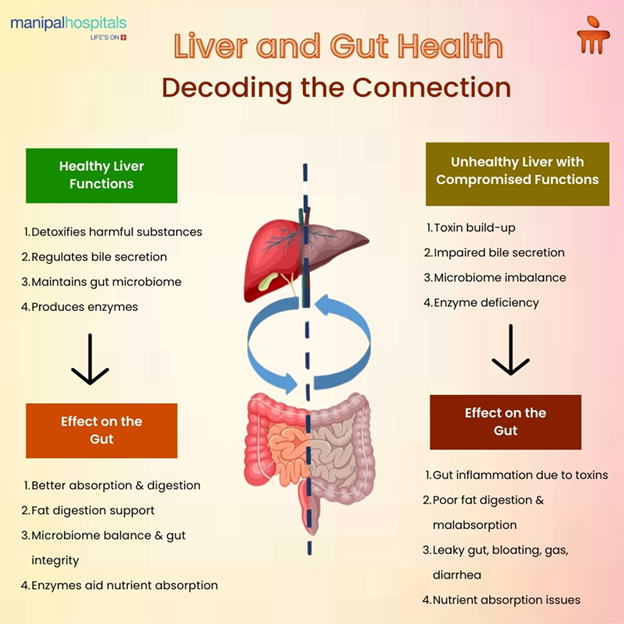
The liver plays a key role in overall well-being and gut health. It supports nutrient absorption and detoxification, ensuring the digestive system functions efficiently. But have you ever wondered what happens when liver health is affected? Poor liver health can lead to many digestive issues, such as bloating, indigestion, and malabsorption of nutrients etc.
In this blog, an experienced gastroenterologist in Vijayawada discusses
-
Discusses the functions of the liver.
-
Explains how improper functioning of the liver can lead to gastrointestinal issues
-
Offers practical tips to support both liver and gut health
Synopsis
What Primary Functions Does the Liver Perform?
The liver works around the clock to process what you eat and drink, making sure your body gets the nutrients it needs while eliminating harmful substances. Your liver sustains three fundamental body functions, namely detoxification, metabolism, and digestion, through the following primary functions:
-
Bile Production: Your liver makes bile, a yellow liquid that assists your body in digesting fats. It's held in the gallbladder and released into your intestines during meals. Without sufficient bile, your body can't effectively break down fatty foods and absorb fat-soluble vitamins (such as vitamins A, D, E, and K).
-
Nutrient Metabolism: Following intestinal nutrient absorption, the liver chemically transforms absorbed nutrients into substances that fuel the body with energy or are stored for later use and other metabolic requirements.
-
Detoxification: Every day, your liver filters out toxins from your blood, including alcohol, chemicals, and leftover medications. By doing this, it prevents harmful substances from entering your digestive tract and disrupting your gut health.
-
Hormone Regulation: The liver also regulates hormones, several of which influence how your digestive system functions. An unhealthy liver fails to keep these hormones under control, leading to rougher digestion and poor gastrointestinal health.
How Does an Unhealthy Liver Affect Gut Health?
When the liver is healthy, it supports the proper functioning of the digestive system. However, when your liver experiences any dysfunction, it can lead to a cascade of gastrointestinal problems. Some of these are discussed below:

-
Digestive disturbances and inflammation in the gut: Since your liver is involved in detoxifying harmful substances and processing nutrients absorbed from food, compromised liver health would lead to toxins building up. This can thus lead to digestive disturbances and inflammation in the gut.
-
Difficulty Digesting Fats: The liver’s ability to produce and regulate bile may get affected due to poor liver health. Without sufficient bile, your body has a hard time digesting fatty foods, making you feel heavy or queasy after eating.
-
Imbalance in gut bacteria: A compromised liver can impair the balance of bacteria in your gut. This imbalance might result in issues such as diarrhoea, gas, constipation, or persistent bloating.
-
Leaky gut syndrome: Your liver maintains the gut lining shield. When it isn't functioning properly, the gut barrier might become compromised, and toxins may seep into your body. This is referred to as "leaky gut" and can lead to systemic inflammation and gastrointestinal problems.
-
Enzyme deficiencies and poor digestion: The liver helps regulate digestive enzymes that break down food, ensuring nutrients are properly absorbed. A malfunctioning liver can lead to enzyme deficiencies and poor digestion.
Gut Health Diet: Foods That Support Both Liver and Gut Health
The good news? You can nourish your liver and gut simply by eating the right foods. A gut-healthy diet plays a pivotal role in supporting liver function and overall digestive health. A diet especially rich in anti-inflammatory foods, fibre, and healthy fats can help the liver and gut thrive, reducing the risk of gastrointestinal problems and promoting stomach health. Here are some foods that support both liver health and gut health:
-
Leafy Greens: All dark leafy greens, like kale or spinach, are rich in fibre, antioxidants, and vitamins. These support the liver’s detoxification processes and promote a healthy gut microbiome.
-
Fatty Fish: Salmon, mackerel, and sardines are types of fish that are rich in omega-3 fatty acids. These fatty acids reduce liver inflammation and promote a healthy gut by balancing the microbiome.
-
Berries: Berries are packed with powerful antioxidants, which not only shield the liver from oxidative damage but also significantly alleviate inflammation in the gut.
-
Whole Grains: Brown rice, quinoa, and oats are excellent sources of fibre, which supports liver function and digestion. Fibre aids in nutrient absorption and helps maintain healthy bowel movements.
-
Nuts and Seeds: Almonds, chia seeds, and flaxseeds provide healthy fats, fibre, and essential vitamins that support the liver’s detoxification process and improve digestion.
-
Probiotic-Rich Foods: Foods like yoghurt, kefir, and fermented vegetables contain probiotics, which promote a healthy gut microbiome, help balance bacteria, and support liver health.
Conclusion
The liver is integral in maintaining gut health and supporting stomach health. It ensures the digestive system functions properly, from producing bile to detoxifying harmful substances. Gut and liver health are interlinked, and you can support both by focusing on a diet rich in fibre and anti-inflammatory ingredients. Regular liver health maintenance and a balanced gut health diet will keep your digestive system running smoothly and reduce the risk of gastrointestinal problems. Frequent or persistent gastrointestinal issues, such as bloating or indigestion, can be indicative of poor liver health. Consulting expert gastroenterologists at Manipal Hospitals, Vijayawada.
FAQ's
Your liver assists in the production of bile to break down fats, processes nutrients, eliminates toxins, and regulates hormones. All of these contribute to healthy digestion.
Yes. An increased fibre, healthy fat, and antioxidant content diet can alleviate liver stress and promote a healthy gut ecosystem.
Leafy greens, whole grain foods, berries, fatty fish, and probiotic foods are excellent for both.
If your liver is unable to process toxins or fats effectively, it influences the way your gut functions. This can result in indigestion, bloating, and discomfort.
Yes. Foods such as greens, garlic, berries, and fermented vegetables aid in your liver's natural detox processes.





















 6 Min Read
6 Min Read

















